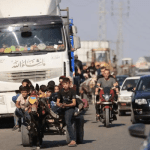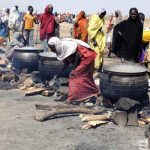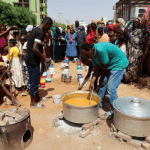Humanitarian organizations have warned that Gaza faces the threat of disease and starvation as a result of aid deliveries being suspended due to a lack of fuel and a communications blackout.
Aid deliveries into the enclave have resumed as Israel continues to restrict fuel supplies. On Friday, the World Food Programme (WFP) of the United Nations stated that civilians in Gaza faced the “immediate possibility of starvation”.
The World Health Organization warned that disease is spreading rapidly.
The halt in deliveries of humanitarian supplies is deepening the misery of hungry and homeless Palestinians as Israel’s war drags on.
While Israel has been allowing some aid to cross into Gaza via the Rafah border crossing linking the enclave with Egypt, it has allowed barely any fuel through.
Aid agencies say this is scampering the distribution of supplies. Palestinian telecommunications companies Jawwal and Paltel said on Thursday that their networks went out of service after they ran out of fuel. There have been several communications blackouts in Gaza during the Israeli assault.
Aid agencies stress that the delivery of all aid and medical care depends crucially on fuel supplies.
Israel’s war cabinet announced on Friday afternoon that it would allow two fuel trucks per day into Gaza “for UN needs”.
The fuel is intended to provide “minimal” support for water, sewerage and sanitary systems to prevent pandemics, an official said.
The UN said there would be no cross-border aid operation on Friday due to fuel shortages and the communications shutdown. For a second consecutive day on Thursday, no aid trucks arrived in Gaza due to a lack of fuel for distributing relief.
WFP Executive Director Cindy McCain said nearly the entire population was in desperate need of food assistance.
“Supplies of food and water are practically non-existent in Gaza and only a fraction of what is needed is arriving through the borders,” she said in a statement.
“With winter fast approaching, unsafe and overcrowded shelters, and the lack of clean water, civilians are facing the immediate possibility of starvation,” McCain said.
“Food production has come to an almost complete halt, markets have collapsed, fishermen cannot access the sea, farmers cannot reach their farms,” Abeer Etefa, a Middle East regional spokesperson for the WFP added.
“People are facing the immediate possibility of starvation.”
Meanwhile, the World Health Organization said it was very worried about the spread of disease in Gaza, citing more than 70,000 reported cases of acute respiratory infections and at least 44,000 cases of diarrhoea, far more than expected.
Humanitarian organizations have warned that Gaza faces the threat of disease and starvation as a result of aid deliveries being suspended due to a lack of fuel and a communications blackout.
Aid deliveries into the enclave have resumed as Israel continues to restrict fuel supplies. On Friday, the World Food Programme (WFP) of the United Nations stated that civilians in Gaza faced the “immediate possibility of starvation”.
The World Health Organization warned that disease is spreading rapidly.
The halt in deliveries of humanitarian supplies is deepening the misery of hungry and homeless Palestinians as Israel’s war drags on.
While Israel has been allowing some aid to cross into Gaza via the Rafah border crossing linking the enclave with Egypt, it has allowed barely any fuel through.
Aid agencies say this is scampering the distribution of supplies. Palestinian telecommunications companies Jawwal and Paltel said on Thursday that their networks went out of service after they ran out of fuel. There have been several communications blackouts in Gaza during the Israeli assault.
Aid agencies stress that the delivery of all aid and medical care depends crucially on fuel supplies.
Israel’s war cabinet announced on Friday afternoon that it would allow two fuel trucks per day into Gaza “for UN needs”.
The fuel is intended to provide “minimal” support for water, sewerage and sanitary systems to prevent pandemics, an official said.
The UN said there would be no cross-border aid operation on Friday due to fuel shortages and the communications shutdown. For a second consecutive day on Thursday, no aid trucks arrived in Gaza due to a lack of fuel for distributing relief.
WFP Executive Director Cindy McCain said nearly the entire population was in desperate need of food assistance.
“Supplies of food and water are practically non-existent in Gaza and only a fraction of what is needed is arriving through the borders,” she said in a statement.
“With winter fast approaching, unsafe and overcrowded shelters, and the lack of clean water, civilians are facing the immediate possibility of starvation,” McCain said.
“Food production has come to an almost complete halt, markets have collapsed, fishermen cannot access the sea, farmers cannot reach their farms,” Abeer Etefa, a Middle East regional spokesperson for the WFP added.
“People are facing the immediate possibility of starvation.”
Meanwhile, the World Health Organization said it was very worried about the spread of disease in Gaza, citing more than 70,000 reported cases of acute respiratory infections and at least 44,000 cases of diarrhoea, far more than expected.
Humanitarian organizations have warned that Gaza faces the threat of disease and starvation as a result of aid deliveries being suspended due to a lack of fuel and a communications blackout.
Aid deliveries into the enclave have resumed as Israel continues to restrict fuel supplies. On Friday, the World Food Programme (WFP) of the United Nations stated that civilians in Gaza faced the “immediate possibility of starvation”.
The World Health Organization warned that disease is spreading rapidly.
The halt in deliveries of humanitarian supplies is deepening the misery of hungry and homeless Palestinians as Israel’s war drags on.
While Israel has been allowing some aid to cross into Gaza via the Rafah border crossing linking the enclave with Egypt, it has allowed barely any fuel through.
Aid agencies say this is scampering the distribution of supplies. Palestinian telecommunications companies Jawwal and Paltel said on Thursday that their networks went out of service after they ran out of fuel. There have been several communications blackouts in Gaza during the Israeli assault.
Aid agencies stress that the delivery of all aid and medical care depends crucially on fuel supplies.
Israel’s war cabinet announced on Friday afternoon that it would allow two fuel trucks per day into Gaza “for UN needs”.
The fuel is intended to provide “minimal” support for water, sewerage and sanitary systems to prevent pandemics, an official said.
The UN said there would be no cross-border aid operation on Friday due to fuel shortages and the communications shutdown. For a second consecutive day on Thursday, no aid trucks arrived in Gaza due to a lack of fuel for distributing relief.
WFP Executive Director Cindy McCain said nearly the entire population was in desperate need of food assistance.
“Supplies of food and water are practically non-existent in Gaza and only a fraction of what is needed is arriving through the borders,” she said in a statement.
“With winter fast approaching, unsafe and overcrowded shelters, and the lack of clean water, civilians are facing the immediate possibility of starvation,” McCain said.
“Food production has come to an almost complete halt, markets have collapsed, fishermen cannot access the sea, farmers cannot reach their farms,” Abeer Etefa, a Middle East regional spokesperson for the WFP added.
“People are facing the immediate possibility of starvation.”
Meanwhile, the World Health Organization said it was very worried about the spread of disease in Gaza, citing more than 70,000 reported cases of acute respiratory infections and at least 44,000 cases of diarrhoea, far more than expected.
Humanitarian organizations have warned that Gaza faces the threat of disease and starvation as a result of aid deliveries being suspended due to a lack of fuel and a communications blackout.
Aid deliveries into the enclave have resumed as Israel continues to restrict fuel supplies. On Friday, the World Food Programme (WFP) of the United Nations stated that civilians in Gaza faced the “immediate possibility of starvation”.
The World Health Organization warned that disease is spreading rapidly.
The halt in deliveries of humanitarian supplies is deepening the misery of hungry and homeless Palestinians as Israel’s war drags on.
While Israel has been allowing some aid to cross into Gaza via the Rafah border crossing linking the enclave with Egypt, it has allowed barely any fuel through.
Aid agencies say this is scampering the distribution of supplies. Palestinian telecommunications companies Jawwal and Paltel said on Thursday that their networks went out of service after they ran out of fuel. There have been several communications blackouts in Gaza during the Israeli assault.
Aid agencies stress that the delivery of all aid and medical care depends crucially on fuel supplies.
Israel’s war cabinet announced on Friday afternoon that it would allow two fuel trucks per day into Gaza “for UN needs”.
The fuel is intended to provide “minimal” support for water, sewerage and sanitary systems to prevent pandemics, an official said.
The UN said there would be no cross-border aid operation on Friday due to fuel shortages and the communications shutdown. For a second consecutive day on Thursday, no aid trucks arrived in Gaza due to a lack of fuel for distributing relief.
WFP Executive Director Cindy McCain said nearly the entire population was in desperate need of food assistance.
“Supplies of food and water are practically non-existent in Gaza and only a fraction of what is needed is arriving through the borders,” she said in a statement.
“With winter fast approaching, unsafe and overcrowded shelters, and the lack of clean water, civilians are facing the immediate possibility of starvation,” McCain said.
“Food production has come to an almost complete halt, markets have collapsed, fishermen cannot access the sea, farmers cannot reach their farms,” Abeer Etefa, a Middle East regional spokesperson for the WFP added.
“People are facing the immediate possibility of starvation.”
Meanwhile, the World Health Organization said it was very worried about the spread of disease in Gaza, citing more than 70,000 reported cases of acute respiratory infections and at least 44,000 cases of diarrhoea, far more than expected.
Humanitarian organizations have warned that Gaza faces the threat of disease and starvation as a result of aid deliveries being suspended due to a lack of fuel and a communications blackout.
Aid deliveries into the enclave have resumed as Israel continues to restrict fuel supplies. On Friday, the World Food Programme (WFP) of the United Nations stated that civilians in Gaza faced the “immediate possibility of starvation”.
The World Health Organization warned that disease is spreading rapidly.
The halt in deliveries of humanitarian supplies is deepening the misery of hungry and homeless Palestinians as Israel’s war drags on.
While Israel has been allowing some aid to cross into Gaza via the Rafah border crossing linking the enclave with Egypt, it has allowed barely any fuel through.
Aid agencies say this is scampering the distribution of supplies. Palestinian telecommunications companies Jawwal and Paltel said on Thursday that their networks went out of service after they ran out of fuel. There have been several communications blackouts in Gaza during the Israeli assault.
Aid agencies stress that the delivery of all aid and medical care depends crucially on fuel supplies.
Israel’s war cabinet announced on Friday afternoon that it would allow two fuel trucks per day into Gaza “for UN needs”.
The fuel is intended to provide “minimal” support for water, sewerage and sanitary systems to prevent pandemics, an official said.
The UN said there would be no cross-border aid operation on Friday due to fuel shortages and the communications shutdown. For a second consecutive day on Thursday, no aid trucks arrived in Gaza due to a lack of fuel for distributing relief.
WFP Executive Director Cindy McCain said nearly the entire population was in desperate need of food assistance.
“Supplies of food and water are practically non-existent in Gaza and only a fraction of what is needed is arriving through the borders,” she said in a statement.
“With winter fast approaching, unsafe and overcrowded shelters, and the lack of clean water, civilians are facing the immediate possibility of starvation,” McCain said.
“Food production has come to an almost complete halt, markets have collapsed, fishermen cannot access the sea, farmers cannot reach their farms,” Abeer Etefa, a Middle East regional spokesperson for the WFP added.
“People are facing the immediate possibility of starvation.”
Meanwhile, the World Health Organization said it was very worried about the spread of disease in Gaza, citing more than 70,000 reported cases of acute respiratory infections and at least 44,000 cases of diarrhoea, far more than expected.
Humanitarian organizations have warned that Gaza faces the threat of disease and starvation as a result of aid deliveries being suspended due to a lack of fuel and a communications blackout.
Aid deliveries into the enclave have resumed as Israel continues to restrict fuel supplies. On Friday, the World Food Programme (WFP) of the United Nations stated that civilians in Gaza faced the “immediate possibility of starvation”.
The World Health Organization warned that disease is spreading rapidly.
The halt in deliveries of humanitarian supplies is deepening the misery of hungry and homeless Palestinians as Israel’s war drags on.
While Israel has been allowing some aid to cross into Gaza via the Rafah border crossing linking the enclave with Egypt, it has allowed barely any fuel through.
Aid agencies say this is scampering the distribution of supplies. Palestinian telecommunications companies Jawwal and Paltel said on Thursday that their networks went out of service after they ran out of fuel. There have been several communications blackouts in Gaza during the Israeli assault.
Aid agencies stress that the delivery of all aid and medical care depends crucially on fuel supplies.
Israel’s war cabinet announced on Friday afternoon that it would allow two fuel trucks per day into Gaza “for UN needs”.
The fuel is intended to provide “minimal” support for water, sewerage and sanitary systems to prevent pandemics, an official said.
The UN said there would be no cross-border aid operation on Friday due to fuel shortages and the communications shutdown. For a second consecutive day on Thursday, no aid trucks arrived in Gaza due to a lack of fuel for distributing relief.
WFP Executive Director Cindy McCain said nearly the entire population was in desperate need of food assistance.
“Supplies of food and water are practically non-existent in Gaza and only a fraction of what is needed is arriving through the borders,” she said in a statement.
“With winter fast approaching, unsafe and overcrowded shelters, and the lack of clean water, civilians are facing the immediate possibility of starvation,” McCain said.
“Food production has come to an almost complete halt, markets have collapsed, fishermen cannot access the sea, farmers cannot reach their farms,” Abeer Etefa, a Middle East regional spokesperson for the WFP added.
“People are facing the immediate possibility of starvation.”
Meanwhile, the World Health Organization said it was very worried about the spread of disease in Gaza, citing more than 70,000 reported cases of acute respiratory infections and at least 44,000 cases of diarrhoea, far more than expected.
Humanitarian organizations have warned that Gaza faces the threat of disease and starvation as a result of aid deliveries being suspended due to a lack of fuel and a communications blackout.
Aid deliveries into the enclave have resumed as Israel continues to restrict fuel supplies. On Friday, the World Food Programme (WFP) of the United Nations stated that civilians in Gaza faced the “immediate possibility of starvation”.
The World Health Organization warned that disease is spreading rapidly.
The halt in deliveries of humanitarian supplies is deepening the misery of hungry and homeless Palestinians as Israel’s war drags on.
While Israel has been allowing some aid to cross into Gaza via the Rafah border crossing linking the enclave with Egypt, it has allowed barely any fuel through.
Aid agencies say this is scampering the distribution of supplies. Palestinian telecommunications companies Jawwal and Paltel said on Thursday that their networks went out of service after they ran out of fuel. There have been several communications blackouts in Gaza during the Israeli assault.
Aid agencies stress that the delivery of all aid and medical care depends crucially on fuel supplies.
Israel’s war cabinet announced on Friday afternoon that it would allow two fuel trucks per day into Gaza “for UN needs”.
The fuel is intended to provide “minimal” support for water, sewerage and sanitary systems to prevent pandemics, an official said.
The UN said there would be no cross-border aid operation on Friday due to fuel shortages and the communications shutdown. For a second consecutive day on Thursday, no aid trucks arrived in Gaza due to a lack of fuel for distributing relief.
WFP Executive Director Cindy McCain said nearly the entire population was in desperate need of food assistance.
“Supplies of food and water are practically non-existent in Gaza and only a fraction of what is needed is arriving through the borders,” she said in a statement.
“With winter fast approaching, unsafe and overcrowded shelters, and the lack of clean water, civilians are facing the immediate possibility of starvation,” McCain said.
“Food production has come to an almost complete halt, markets have collapsed, fishermen cannot access the sea, farmers cannot reach their farms,” Abeer Etefa, a Middle East regional spokesperson for the WFP added.
“People are facing the immediate possibility of starvation.”
Meanwhile, the World Health Organization said it was very worried about the spread of disease in Gaza, citing more than 70,000 reported cases of acute respiratory infections and at least 44,000 cases of diarrhoea, far more than expected.
Humanitarian organizations have warned that Gaza faces the threat of disease and starvation as a result of aid deliveries being suspended due to a lack of fuel and a communications blackout.
Aid deliveries into the enclave have resumed as Israel continues to restrict fuel supplies. On Friday, the World Food Programme (WFP) of the United Nations stated that civilians in Gaza faced the “immediate possibility of starvation”.
The World Health Organization warned that disease is spreading rapidly.
The halt in deliveries of humanitarian supplies is deepening the misery of hungry and homeless Palestinians as Israel’s war drags on.
While Israel has been allowing some aid to cross into Gaza via the Rafah border crossing linking the enclave with Egypt, it has allowed barely any fuel through.
Aid agencies say this is scampering the distribution of supplies. Palestinian telecommunications companies Jawwal and Paltel said on Thursday that their networks went out of service after they ran out of fuel. There have been several communications blackouts in Gaza during the Israeli assault.
Aid agencies stress that the delivery of all aid and medical care depends crucially on fuel supplies.
Israel’s war cabinet announced on Friday afternoon that it would allow two fuel trucks per day into Gaza “for UN needs”.
The fuel is intended to provide “minimal” support for water, sewerage and sanitary systems to prevent pandemics, an official said.
The UN said there would be no cross-border aid operation on Friday due to fuel shortages and the communications shutdown. For a second consecutive day on Thursday, no aid trucks arrived in Gaza due to a lack of fuel for distributing relief.
WFP Executive Director Cindy McCain said nearly the entire population was in desperate need of food assistance.
“Supplies of food and water are practically non-existent in Gaza and only a fraction of what is needed is arriving through the borders,” she said in a statement.
“With winter fast approaching, unsafe and overcrowded shelters, and the lack of clean water, civilians are facing the immediate possibility of starvation,” McCain said.
“Food production has come to an almost complete halt, markets have collapsed, fishermen cannot access the sea, farmers cannot reach their farms,” Abeer Etefa, a Middle East regional spokesperson for the WFP added.
“People are facing the immediate possibility of starvation.”
Meanwhile, the World Health Organization said it was very worried about the spread of disease in Gaza, citing more than 70,000 reported cases of acute respiratory infections and at least 44,000 cases of diarrhoea, far more than expected.














